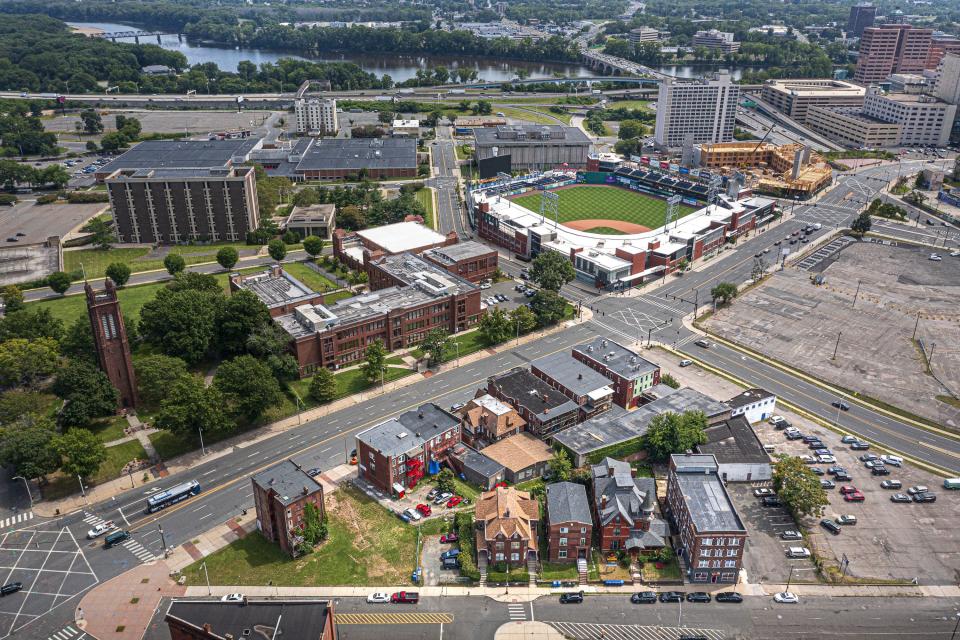Corporate investment in Hartford redevelopment projects a sign of growing confidence in city projects
New private investment in construction around Dunkin’ Donuts Park represents a small but significant statement of confidence in Hartford’s redevelopment.
Two major companies — Bloomfield-based health insurer Cigna and New Britain-based tool and storage giant Stanley Black & Decker — are making loans totaling $1.7 million through the Capital Region Development Authority.
“The fact that these two companies are participating financially in a project that is so significant to Hartford’s future and Hartford’s development is a strong statement that they have confidence in where we are headed and they believe that a strong and vibrant Hartford is good for everyone,” Hartford Mayor Luke Bronin said.
Bronin said the city and CRDA, which helps finance projects with state taxpayer-backed loans and equity investments, have had conversations with corporate leaders in recent years about the goals of redevelopment in the city, especially around increasing housing to make downtown and the city’s neighborhoods more vibrant.
“I am hopeful that this initial pair of investments will be the first but not the last,” Bronin said.
The low-cost loans from Cigna and Stanley Black & Decker are contributing to the financing of the $200 million-plus North Crossing, the former Downtown North, or DoNo. The first 270 of 1,000 or more apartments eventually planned for around the ballpark are now under construction at Morgan and Main streets and could be ready for occupancy in the spring.
The loans signal that large corporations are getting increasingly comfortable with the city’s redevelopment strategy, and its results since CRDA was formed in 2013.
Since then, CRDA has invested $117 million of public funding in low-cost loans and equity investments, supporting $435 million in development in more than two dozen housing projects in and around downtown. Almost all of those projects converted former commercial spaces into rentals, with 2,100 apartments created, according to a CRDA analysis in May, toward a goal of reaching 3,000.
Based on property appraisals from before and after the conversions, $294 million of value has been created, CRDA said. The amount of tax revenue generated for the city wasn’t immediately available.
Michael W. Freimuth, CRDA’s executive director, said the string of housing conversions have, for the most part, held their occupancy levels. There was a dip during the height of the pandemic in 2020, but the majority now at are 90% or better, with a few exceptions, Freimuth said.
If momentum builds behind more corporations making loans into redevelopment, it may be possible to begin dialing back a little on the public investment in projects that now have a demonstrated track record, Freimuth said. That, he said, also could allow CRDA to focus more of its lending to promising — but still risky — projects, particularly in the neighborhoods.
“It’s a measure of where we’ve come from and where we are,” Freimuth said. “It’s an important achievement, but we still have a long way to go.”
Hartford’s history is marked by often heavy corporate involvement in city redevelopment efforts.
In the 1950s and 1960s, powerful corporate chief executives were part of the so-called corporate “bishops” which influenced development and philanthropic pursuits.
Even into the 1980s, insurer Aetna, now owned by CVS Health Corp., was helping to reshape downtown, partnering on the construction of CityPlace I.
A decade earlier, Aetna was instrumental in financing the construction of the nearby Civic Center with a downtown shopping mall. The Civic Center is now the XL Center, and the mall is long gone.
Stanley Black & Decker, which has established an advanced manufacturing “center of excellence” on Constitution Plaza in downtown Hartford, said investing in redevelopment is another way to strengthen the capital city, an essential component for a thriving Connecticut.
“Our support of the DoNo project, one of the largest redevelopment projects underway in downtown Hartford, is one way we are working with partners like Cigna to help drive positive change in the city of Hartford,” Stanley Black & Decker said, in an email.
Cigna said it supports investments aimed at revitalizing Hartford neighborhoods and, as a health care company, providing “access to quality affordable housing is critical to helping people lead happier, healthier lives.”
The redevelopment loans open a new investment front for the city, but Bronin and others say the corporate community has been active for years in supporting the city in other initiatives.
In 2017, Aetna and two other major insurers in the city — The Hartford Financial Services Group and Travelers Cos. Inc. — committed to donate $50 million over five years to stabilize the city’s finances.
In Hartford’s Asylum Hill neighborhood, The Hartford has committed more than $10 million in grants for housing rehabilitation projects in the neighborhood around where the insurer is headquartered.
Contact Kenneth R. Gosselin at kgosselin@courant.com.


